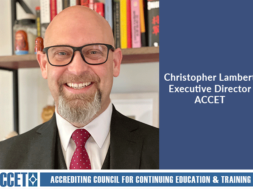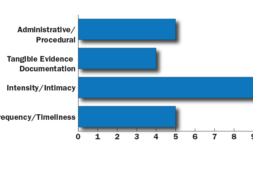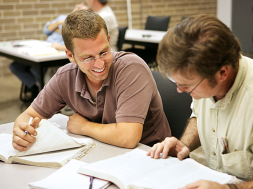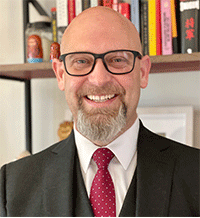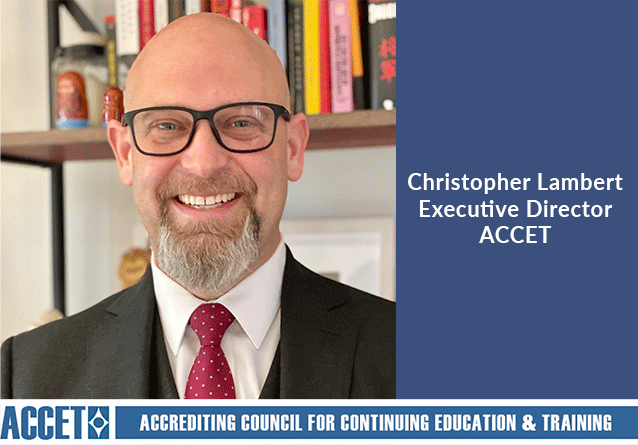
Christopher Lambert: ACCET Positioned Perfectly for Where Higher Education is Going
Written from an interview with Christopher Lambert, Executive Director, ACCET
The Accrediting Council for Continuing Education and Training (ACCET) has a new executive director, Christopher Lambert, who has been involved in accreditation since September of 1996, and is following in his father’s footsteps.
“My dad, Mike Lambert, worked for the National Home Study Council (later the Distance Education and Training Council) for four decades and his last 20 years as its Executive Director. Interestingly enough, in an interview in the March 2013 edition of the Career Education Review, he talked about graduation rates, placement rates, accountability, all of the same themes that we wrangle with eight years later,” Lambert said.
“Twenty-five years at ACCSC, I learned so much about not only the schools and the critical roles our schools play in workforce development and providing pathways for students, but myself, my vision for higher ed, and my appreciation for what our schools do.”
His work with the ACCSC (Accrediting Commission of Career Schools and Colleges) helped prepare him for this career move as executive director of ACCET.
“ACCSC really gave me an opportunity to explore who I wanted to be as a professional. I’ve done everything from on-site evaluations to conferences and events, to membership support, to congressional relations, and it really gave me a well-rounded experience in accreditation to put all those pieces together and get a holistic understanding, which helped me really start to develop a sense for my own vision of what accreditation needs to be doing, how we can embrace and use technology to further the human connection,” Lambert said. “I’m just so excited to be part of a team that has an amazing reputation like ACCET, with a legacy of excellence, including back-to-back cycles of recognition with the U.S. Department of Education with no findings of non-compliance.”
There were a lot of reasons behind his applying for this position, but being a change agent was one of the most important.
“For me, what made the most sense was the scope of recognition here is so broad that if you look at the way higher education is changing, you look at coding bootcamps, badge programs, certifications, step programs, short term coursework, clearly there is a growing role for certificate and diploma programs. I felt like this organization was really positioned well to change the way that higher education is perceived,” Lambert explained. “I really leapt at the opportunity to be part of that, and to be in that ultimate leadership role. I’ve thought about this for a long time, and this was the one time when it actually made the most sense for me, given where I was in my career and the experience I’ve had.”
As a new executive director, the sixth in the 47-year ACCET history, Lambert has some long-term and short-term goals for the organization.
“I have a desire to move forward, and more than just for ACCET, I mean for our community of schools. I believe this pandemic has been a tremendous hardship for everyone. I think we all continue to struggle with loss. We lost our most precious commodity of time, and we lost our human connection with one another. While I recognize that accreditation is a small part of what we are all dealing with as educators, one of the things that I believe is that education will help millions of people get the momentum they need to come out of this pandemic,” Lambert said. “And so I think education is there for many as a platform, to improve their station in life. I feel like we have advanced quite a bit with technology, and really what we saw over the last 15 months was society’s willingness to adopt and adapt to technology. I don’t know if many of us as educators would have been as open to using Zoom and Teams for these virtual meetings before this pandemic, but now that we have, I don’t think there’s going back.”
Besides moving forward, another goal is to advance technology and to work on human connection.
“I don’t see vision as a plan to go back to the way things were before the pandemic. At least that’s not vision to me. So the question becomes, how can we use this technology to increase efficiency for schools, to increase our effectiveness as accreditors to do quality assessment through data analysis? But at the same time, to not lose that human connection … these kinds of touchpoints we need to have as an organization to get in the classroom to interface with students, to talk to employers, and I think technologies can be a permanent part of that,” Lambert said. “I envision the expanding role of accreditation much like a school sees their programs in terms of hybridization. What can ACCET do to bring high quality webinars, workshops and conferences online, and then how can ACCET get into the field and connect with our community in meaningful ways that I think all of us are longing for? So that’s my vision. To care about the work as much as we care about one another, to have a safe environment for us to grow as a team, to fulfill our obligations at a high level to provide the accountability we need for students and to hold our schools accountable, and I think technology can play a role in us doing this in a very efficient and a very effective way.”
The pandemic, besides being hard on people emotionally, has had a strong impact on the school communities as well.
“We had a global pandemic that had a devastating impact across the planet, and we know it’s going to have an impact on student achievement. I think accreditors really have done a good job at providing resources on best practices for interactive distance learning. I think they have done a good job under the national emergency of providing flexibilities on leaves of absence,” Lambert said. “Accreditors have also done a good job on establishing tolerances for student achievement. I don’t think an accreditor can apply a traditional and historical metric to institutional performance during a pandemic, and I believe we have to adjust what our tolerance is going to be. Clearly, schools must be held accountable, and the students must have a high-quality educational experience, but looking at it through a pre-pandemic lens, I think is a recipe that’s going to be challenging for us. At the outset of the pandemic, the scenarios we faced as accreditors focused on providing extensions of time, waiving late fees, and now it’s really looking at the data and making sure that it’s reliable data, that it’s accurate, and then trying not to make things worse through a very rigid approach to accountability.” Now that the end of the pandemic is near, schools need to shift their energies from survival mode to improving.
“There are fewer schools and there are more student enrollments because more students are looking at this as an opportunity to upscale and retrain, so they’re in a better position to provide for themselves and provide for their family. So schools need to be ready for that and need to have those accountability frameworks in place, and they need to expect from their accreditor questions about how they’re managing that, and so that’s really where I think the lens will shift,” Lambert said.
Lambert plans on using technology to help support schools in this post-pandemic environment.
“I’m focusing a lot of my energy on support, more workshops, webinars, supportive distance learning, more support on how we communicate, bringing in experts, bringing in teachers, bringing in administrators to share best practices, because if I’m a small school, I just don’t have the resources or the budget to do all that.
There’s a lot ACCET can do via technology, at little to no expense to institutions. You’re going to see a whole suite of services from us,” Lambert said. “One of the things that I’ve really learned to appreciate about accreditation is compliance is baked into it, accountability is baked into it, but it’s always supposed to be about continuous improvement as well, and helping good schools to improve. Over the past few years, at times, it has felt like accreditation was more about ensuring a 100% compliance environment than continuous improvement, so I think we need to do a good job of finding that balance once again, so that we can support our schools and not make things worse by taking a very rigid approach to accountability and not appreciate the impact that the pandemic has had on all of us.”
Congress and the new administration always play a role with accreditation and this time is no different.
“I am meeting with some of the professional staff in Congress to talk about their vision for accreditation. The previous administration had a very comprehensive negotiated rulemaking around the accreditor regulations, so a lot of that foundational work is there. What I hear from the administration and what I hear from Congress are questions, healthy questions, about what accountability means today, and how are accreditors holding schools accountable. Questions about what transparency means today for students, and how can accreditors ensure that students have an opportunity to make informed decisions. I think there is some skepticism about the effectiveness of accreditation, but one of the things that I think gets lost is if you say, ‘Well, accreditation is insufficient in fulfilling its gatekeeping role.’ What I would say is we have a regulatory triad,” Lambert said. “We have the state licensing entity, and I cannot accredit any educational provider that’s not licensed. We have the federal government which is managing the Title IV student loan program. And for accreditors, we focus on staying in our lane of academic quality and quality assurance.”
The triad of educational oversight can do a lot behind the scenes to make education better.
“A lot of my work is done behind the scenes working with the state. The very first phone call I made was to the U.S. Department of Education. The second outreach I made was to the National Association of State Administrators and Supervisors of Private Schools (NASASPS). The relationships that accreditors have with the federal government and state regulatory committee are crucial to being successful, and we do more communicating now than at any other time. Every week I’m speaking to a state regulator and trying to do it in a non-reaction fashion where we have more forward-thinking conversations about how we can plan better to avoid the precipitous closure that’s so devastating to students,” Lambert said.
“And we recently did a lessons learned forum where the Department, states and multiple accreditors all got together and said, ‘What can we do better?’ And I think we’re earnest and trying to do better.”
The lessons learned from that activity taught Lambert much about how to move forward.
“A best practice for operators is that more than anything is you have to be realistic about how things are going. I think sometimes school owners are too close to it or unwilling to realize that they’re going to lose control. If you have an issue, you need to take immediate action,” Lambert said. “When you deal with accreditors, you get a healthy dose of process. Accreditors don’t go zero to warning or zero to probation, unless there are significant and sensitive issues. And so they communicate to you actions to say, ‘We have questions about your accredited status.’ I think schools need to be realistic to take ownership of these programs. It’s an institutional burden, it’s not up to accreditors to figure it out. It’s up to the institution to demonstrate, and showcase, ‘here’s what we have done.’”
Besides the lessons learned about schools, Lambert learned some lessons about supporting teachers as well.
“The biggest lesson learned for me in this pandemic is you cannot take a teacher who might be your best teacher you’ve ever had in the classroom and throw them into an online world and think they’re going to thrive. You have to support them, train them, give them resources, teach them how to use technology,” Lambert said. “What we did when I was at ACCSC during the pandemic was to facilitate a series of best practice workshops. I had school people who’ve been doing distance education for a decade saying, ‘here are our best practices.’ In a face-to-face workshop you’d have 35 people in a room, but throughout the pandemic, we were having 800, 1200, 1600 people. Engage, engage, engage, was the drumbeat. And I think there was a real thirst for it, so I want to keep that momentum of online training and online development.”
The pandemic brought many changes to the career college world, particularly with long-term programs. Lambert’s agency is one of the few that has short-term programs as well, which fared a bit better.
“Historically, the shorter programs have better graduation rates because it’s less time from start to finish, but some of them were tough to manage during the pandemic because of externships or other types of requirements. As we look at how education is diversifying and how we’re adopting and adapting technology I feel like the short courses, the badge programs, the step programs, the coding bootcamps, are all a part of our future. I want to embrace how higher education is changing and put an accountability framework around that because the expectations are the same and it’s all about student success: do your students graduate, can they pass a required licensure exam, and can you demonstrate graduates are getting a job in the field for which training was provided,” Lambert said. “For me, the big challenge is the portability of those short courses, so if I go to an ACCET-accredited school and I earn a badge, is that badge transferable to another provider where I can stack on top of that? And what I know for sure in 25 years is that we continue to fight over the transfer of credits, and we’re going to continue to have that argument, and I think it’s incredibly unfair to students.”
One of the things Lambert hopes can be changed is this issue of transferability and how accreditation is treated differently.
“In 2019, I actually had a chance to meet with Senator Patty Murray and Senator Lamar Alexander. And that’s what I brought up, which is, ‘What are we good at? Accountability, student graduation rates, graduation placement rates. Where do I need help? Transfer of credit.’ If a school is licensed by the state, accredited by an agency recognized by the department, participating in federal financial aid, why are they disrespected so much? And there is no analysis done. What students are consistently told is that, ‘you went to a ‘nationally’ accredited school, and therefore your credits are bogus.’ Based on what? So that’s the challenge that we have to overcome,” Lambert explained.
“I find that grossly offensive because these practices are not based in regulation, it’s not a best practice, and it is absolutely devastating to students who, I think, bear the brunt of it.”
One major change has been to stop regional accreditation and move everyone to national, which will bring about some changes to the accreditation process, although ACCET itself is a global organization with schools in the United States, throughout the Middle East, and elsewhere around the world.
“I feel like ACCET, more than any other agency, is positioned perfectly for where higher education is going, because of our scope and because of the diversity in our scope. We have private postsecondary vocational schools, professional certification organizations, and Intensive English Programs, and I feel that the richness of that, where the vocational schools are teaching the IEP schools, who are learning from the certification entities, who are learning from our international members, that’s the value for me. I welcome the expansion of scope, but let’s have everyone go by the same set of rules, and particularly around accountability,” Lambert said. “ACCET’s 70% employment benchmark might not be the right benchmark for traditional higher education, but what is your benchmark? If my accountability is there, and I can show you graduation rates and show you licensure pass rates, and show you verifiable employment rates in the field, and show you student satisfaction and show you employer satisfaction, why are we not part of the solution? I don’t understand that when the government itself is proposing a massive infrastructure plan, why would you not support these students who have trained in these very fields through federal funding?”
The long-term future of peer review is an important part of quality assessment, according to Lambert.
“There is a richness to peer review that I think is essential to the success of higher education in this country, which I think is the global standard, which is why people want to travel here and come to study here. Without peer review, you get a very bureaucratic audit. I don’t know how that adds value to the student educational experience. When I talk about peer review, I mean the direct impact on student success and a real, profound understanding of what happens in the classroom and what happens in labs and what happens working on externships. When we bring in those specialists and those experts to say, the practical application of that learning, I think that’s the real value of peer review,” Lambert said. “I think it needs to be a permanent part of our quality assurance construct. I would hope that the federal government and the states would feel the same way, because I don’t know what would replace it, or if it would do any better.”
For some reason, though, accreditation is the part of the triad that seems to always get the blame when things go wrong.
“Sometimes the criticism is, ‘Why did it take you so long?’ At times, it feels like it doesn’t matter what happened or what the accreditor does, because at the end of the day, everybody’s going to be angry at the accreditor. Either we got too far ahead of a regulatory partner, or we fell too far behind. This really underscores why we need to have these crucial conversations within the triad. I’ve been spending a lot of time engaging with our partners and making sure I don’t surprise them with anything and they’re aware,” Lambert said.
One issue seems to be that the media doesn’t understand what accreditation actually means, so they just put the blame on accreditors without understanding the process.
“Recently, at a policy conference, a keynote speaker said, ‘Accreditation is crucial, and nobody knows what it does.’ I took that comment to heart and I’ve really tried to engage full-on in my first few weeks by setting up a time to meet with reporters, and my message has been, ‘Ask your question. What do you want to know?’,” Lambert said. “My approach has been not to go in and say, ‘Here’s what you need to know.’ My approach has been, ‘What do I need to know from you? What are your questions? What is your concern?’ My goal here is to really try to keep this communication open. And sometimes that can be uncomfortable for accreditors, but I think it’s necessary where we’re at today.”
Senators Kaine and Portman introduced an amendment for the Pell Grant eligibility to short-term programs which would have excluded proprietary schools (the amendment was excluded from the bill). Lambert feels this is patently unfair.
“You’ve just line-itemed out my entire membership. For what reason? What was the rationale given? I think that I have some tremendous work to do, not necessarily on the school’s behalf, but for my agency, to make them understand that what you are saying is that a recognized institutional accreditor who has maintained recognition since 1978 and who has been 100% compliant for a decade with all requirements is ineligible for short-term funding when that’s exactly what we do, and we do it at a high level. I have data, and I have success stories, and I’m not asking for exceptions, I’m not asking for a waiver, we will meet or exceed every accountability mechanism you have, so why not give us that opportunity?” Lambert said.
“If we’re going to talk about accountability, it should be the same accountability mechanisms for everybody, right? Look at what we do, measure us by how well we perform, and not by these broad generalizations that cut us out of the future of training.”
The ACCET annual conference will be held this coming November and Lambert is very excited about it.
“It’s going to be an awesome conference built around best practices to give school leaders, practical resources and tools to take away with them. It’s a chance for us to both connect and reconnect as a community and start to work more collaboratively together. That’s something I’m really committed to, caring about one another, as much as we care about the work,” Lambert said. “It’s going to be a great jumping-off point for ACCET to talk about where we need to be moving forward. The foundation is here, but if another pandemic or similar catastrophe happens, let’s ensure we’re better prepared to adapt quickly to get online as a society. We have a lot of work to do and a tremendous challenge ahead of us and a lot of skepticism that we need to overcome and help to reshape. I’m excited about it. I have incredible belief and faith in accreditation and in our schools and what they can accomplish” Lambert said.
Christopher D. Lambert brings 25 years of higher education accreditation experience to his role as ACCET’s Executive Director (ED). As the ED, Christopher is responsible for implementing the strategic vision set forth by the ACCET Commission and the continuous development of an innovative, high-touch, professional accreditation service program that provides an accountability framework, resources, and training for an emerging global learning community. Most recently during the global pandemic, Christopher served as an inter-agency project leader charged with the creation and implementation of COVID-19 regulatory protocols and procedures designed to support a diverse array of postsecondary education providers. Christopher is a nationally recognized speaker in the United States who specializes on the evolving role of accreditation, innovation, accountability, and the increasingly expansive roles that technology and human connection play in a global learning environment. Christopher earned a Baccalaureate Degree from Indiana University of Pennsylvania and a Master of Education from The Curry School of Education and Human Development at The University of Virginia.
Contact Information: Christopher D. Lambert // Executive Director // Accrediting Council for Continuing Education and Training // 703-434-0693 // chris@accet.org // www.accet.org
